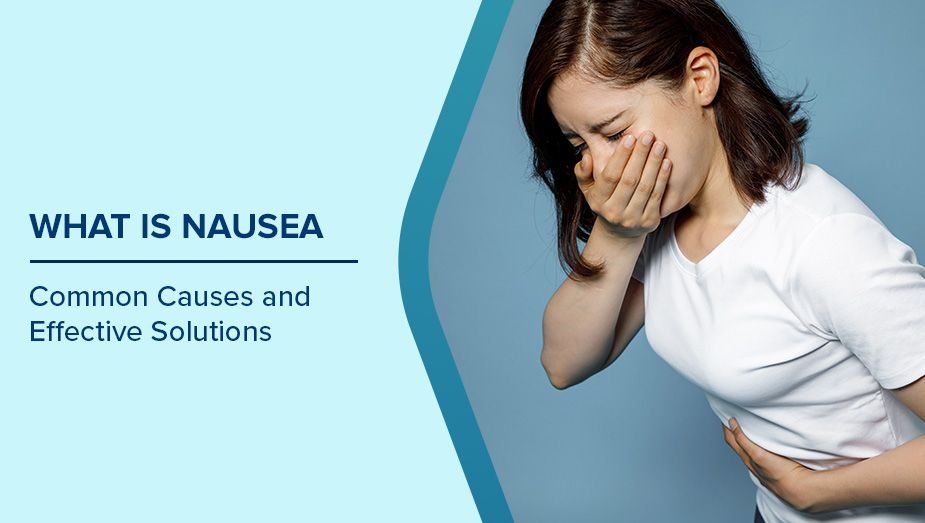Introduction
Nausea and vomiting are common symptoms that almost everyone experiences at some point in life. While often temporary and mild, they can sometimes signal an underlying health issue that requires medical attention. Understanding the causes, risk factors, and treatment options is essential for effective management.
This article explores the causes, symptoms, and safe remedies for nausea and vomiting, along with tips on when to seek professional care.
What Are Nausea and Vomiting?
- Nausea is the uneasy, uncomfortable sensation that makes a person feel like they are about to vomit.
- Vomiting is the forceful expulsion of stomach contents through the mouth, often triggered by nausea.
Though related, nausea does not always lead to vomiting, and vomiting may sometimes occur suddenly without nausea.
Common Causes of Nausea and Vomiting
Several conditions can trigger these symptoms. Some common causes include:
- Gastrointestinal issues: Food poisoning, indigestion, stomach flu, ulcers, or gastritis.
- Infections: Viral or bacterial infections in the stomach and intestines.
- Pregnancy: Morning sickness during early pregnancy is a frequent cause of nausea.
- Medications: Side effects of antibiotics, chemotherapy drugs, or painkillers.
- Motion sickness: Caused by conflicting signals between the inner ear, eyes, and brain.
- Migraine headaches: Often accompanied by nausea and sometimes vomiting.
- Underlying illnesses: Conditions like gallbladder disease, pancreatitis, or appendicitis.
Risk Factors
Certain groups are more likely to experience nausea and vomiting, including:
- Pregnant women
- Children prone to motion sickness or viral infections
- Patients undergoing chemotherapy
- People with gastrointestinal disorders
- Those with chronic migraine conditions
Symptoms That Accompany Nausea and Vomiting
Depending on the underlying cause, nausea and vomiting may be accompanied by:
- Dizziness and sweating
- Stomach cramps
- Headaches or migraines
- Fever and chills (in infections)
- Dehydration signs such as dry mouth, fatigue, and reduced urination
When to Seek Medical Help
Although nausea and vomiting are often harmless and self-limiting, medical help should be sought if symptoms are:
- Persistent for more than 24–48 hours
- Accompanied by severe dehydration
- Linked with severe abdominal pain
- Occurring with high fever
- Present in infants, elderly, or people with chronic illnesses
- Associated with blood in vomit or coffee-ground–like appearance
Effective Treatments and Remedies
Treatment for nausea and vomiting depends on the cause, but some common approaches include:
Home Remedies
- Stay hydrated: Drink small sips of water, clear broth, or electrolyte solutions.
- Eat light meals: Avoid greasy, spicy, or strong-smelling foods.
- Ginger: Ginger tea or ginger supplements can naturally ease nausea.
- Peppermint: Peppermint tea or inhalation may help calm the stomach.
- Rest: Lying down in a slightly elevated position reduces discomfort.
Medications
- Antiemetics: Drugs like ondansetron, promethazine, or metoclopramide help control vomiting.
- Antihistamines: Used for motion sickness and mild nausea.
- Proton pump inhibitors or antacids: Helpful when nausea is linked to acid reflux or ulcers.
Lifestyle Adjustments
- Eat smaller, frequent meals.
- Avoid strong odors and environments that trigger nausea.
- Practice relaxation techniques such as deep breathing or meditation.
- Ensure adequate sleep and hydration daily.
Special Considerations in Pregnancy
Nausea and vomiting during pregnancy, commonly known as morning sickness, affect many women in the first trimester. While mild symptoms are normal, severe and persistent vomiting (hyperemesis gravidarum) requires medical care to prevent dehydration and weight loss.
Preventing Nausea and Vomiting
Some simple preventive strategies include:
- Taking medications with food (if advised by a doctor).
- Avoiding overeating or lying down immediately after meals.
- Managing stress and anxiety effectively.
- Using motion sickness bands during travel.
- Following a balanced diet with adequate vitamins and minerals.
Final Thoughts
Nausea and vomiting are uncomfortable but usually manageable symptoms. In most cases, they are temporary and can be relieved with hydration, rest, and dietary adjustments. However, persistent or severe cases may indicate an underlying condition that requires medical evaluation. With proper care, safe medications, and lifestyle changes, individuals can effectively manage nausea and vomiting while preventing future episodes

